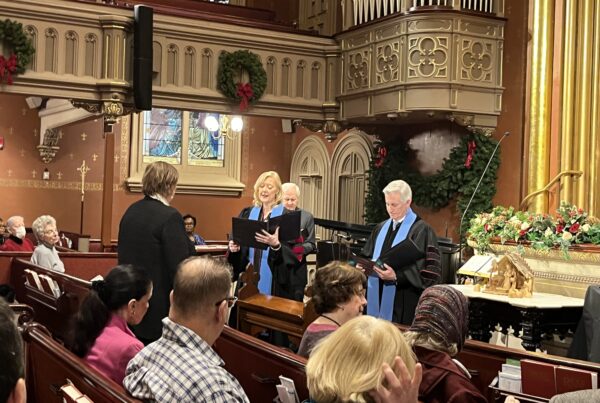M eg looked at Phillip across the kitchen table and didn’t have anything more to say. Their eyes were bloodshot, they’d both shed tears, and their voices were hoarse from arguing. From an outside perspective, they looked like a suburban family who was doing fine. On the inside, their desire to keep up with the lifestyle of others, and a willingness to take on debt to do so, had kept them living paycheck to paycheck. Now, one unexpected medical bill brought the veneer crashing down. They were completely leveraged, didn’t have the cash to pay this bill, and were faced with an unavoidable certitude that they must go somewhere that they had been avoiding. The journey up and out of this difficult moment would be painful.
When you think about the gospel of Jesus, does a story like that come to mind?
My guess is that most people wouldn’t classify a situation like Meg and Phillip’s as “good news.” But these moments where you must go but don’t want to go are often the ones that lead to the future God is calling you to—a brighter future, if you can believe it’s true, in the midst of the darkness.
I was struck by this concept recently when I was reading some words written by Father Richard Rohr. He writes:
Jesus tells the growing crowds, “It is an evil and adulterous generation that wants a sign” (Luke 11:29), and then says the only sign he will give is the sign of Jonah. As a Jew, Jesus knew well the graphic story of Jonah the prophet who ran from God and was used by God almost in spite of himself. Jonah was swallowed by a whale and taken where he would rather not go. This was Jesus’ metaphor for death and rebirth.
Rather than look for impressive apparitions or miracles, Jesus said we must go inside the whale’s belly for a while. Then and only then will we be spit out on a new shore and understand our call, our place, and our purpose.
Most of us remember the basics of the story of Jonah from our childhood Bible stories. God called Jonah somewhere, and Jonah ran the other way. A large sea creature then swallowed Jonah whole, and in the dark belly of the creature, Jonah came to terms with his avoidance of what God wanted him to do.
What have been your “belly of the whale” moments? Getting your blood work back from the doctor, showing that your diet is bringing you dangerously close to being sick? Arguing with your child because they’re living life differently than you had hoped, and now they won’t speak to you? Getting stuck in an endless cycle of credit card debt that seems to thwart any forward progress in your life?
We all have many moments when we find ourselves in the belly of the whale, when we are confronted with our avoidance of living the full, courageous lives to which God calls us. Rather than avoiding these moments at all costs, what if we could embrace them? What if we could view them as necessary for something new?
Meg and Phillip did not let their belly of the whale moment destroy their marriage. Even though they wouldn’t have articulated it this way at the time, they accepted that moment of entering the belly of the whale and admitted they were tired of living this way; they wanted something different. They wanted a lifestyle where they weren’t worried about an unexpected bill, where they felt secure, and also where they were living with a spirit of generosity that reflected their faith.
The journey forward was not easy, but they would both say that it was incredibly freeing and rewarding. Yes, they had to make hard choices. As they got out of debt and onto a budget, they couldn’t spend in the same ways that their friends and neighbors could (many of whom were suffering in the same way financially behind closed doors). They look back on that moment at the kitchen table, looking at each other with frustration and desperation, as a gift. It was an invitation to go somewhere they didn’t want to go. But sitting in the belly of the whale took them to a destination that was so much better.
My encouragement to all who find themselves on the cusp of a belly of the whale moment financially, is to greet this moment with a curious acceptance. Often, God brings us to these moments in order to lead us into new life. So, go to that place with God.
And, finally, know that you’re not alone. There are many resources available to help you face the financial challenges you’ve been avoiding. I suggest LSS Financial Counseling for managing debt, or financial planning through Everence Financial, experts in understanding the unique financial needs of clergy. Or, if you’re facing a belly of the whale moment and don’t know where to turn, I invite you to contact me for some resources that might help you.

Billy Norden
Billy Norden serves as retirement and financial education coordinator for the Reformed Church in America’s Board of Benefits Services. You can connect with Billy at bnorden@rca.org.



